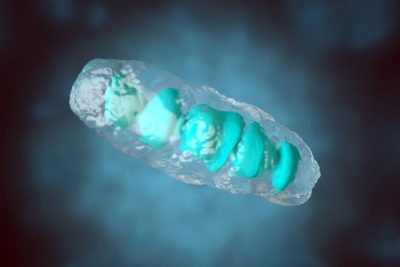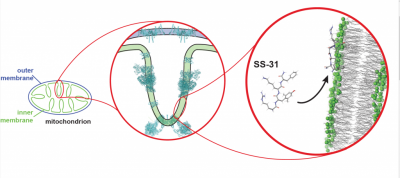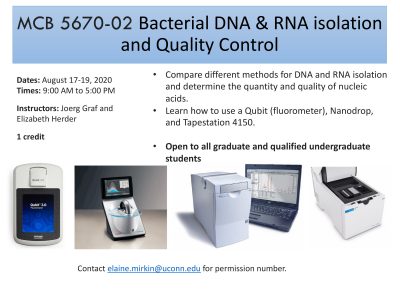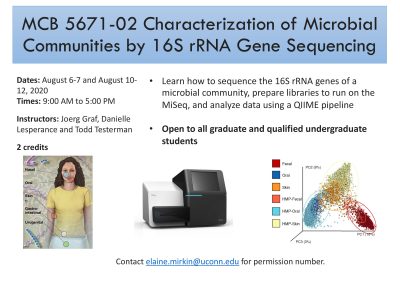The following MCB Undergraduate students received 2020 Summer Undergraduate Research Fund awards in support of their summer undergraduate research projects. All SURF projects will be pursued remotely this summer in accordance with restrictions on undergraduate research due to COVID-19. Please note that the project titles listed reflect the original projects proposed.
Akriti Bhattarai '21 (Molecular and Cell Biology, CLAS) Project Title: Identification of Putative Resistance Genes in the Sugar Pine Genome (Pinus lambertiana) and across the White Pines Faculty Mentor: Dr. Jill Wegrzyn, Ecology and Evolutionary Biology
Rei Bufi '21 (Molecular and Cell Biology, CLAS; Individualized Major: Globalization, Art, and Activism, CLAS) Project Title: The Need for Evidence-Based Exercise Intervention for Non-Alcoholic Fatty Liver Disease: A Systematic Review and Meta-Analysis Faculty Mentor: Dr. Linda Pescatello, Kinesiology
Daniel Fairchild '21 (Structural Biology and Biophysics, CLAS; Molecular and Cell Biology, CLAS) Project Title: Near IR Tethered Bichromophoric Fluorophore-Quencher Voltage Sensitive Dye Faculty Mentor: Dr. Ping Yan, Center for Cell Analysis and Modeling
Elena Haarer '21 (Molecular and Cell Biology, CLAS) Project Title: Defining the Functions of the Actin Cytoskeleton in Cellular Senescence and Biological Aging Faculty Mentor: Dr. Kenneth Campellone, Molecular and Cell Biology
Sarah Kricheff, Dec. '20 (Molecular and Cell Biology, CLAS) Project Title: Developing a Biosensor for Mechanical Tension in Live Cells Faculty Mentor: Dr. Yi Wu, Genetics and Genome Sciences
Katherine Lee '22 (Structural Biology and Biophysics, CLAS) Project Title: Computational Investigations into Allostery and Binding Dynamics of Tau Protein Antibodies: Affinity, Specificity and the Potential for Intentional Design Faculty Mentor: Dr. Eric May, Molecular and Cell Biology
Roshni Mehta '22 (Molecular and Cell Biology, CLAS; French, CLAS) Project Title: Who Let the DoGs Out? An Analysis of RNA Transcription Readthrough and Termination Faculty Mentor: Dr. Leighton Core, Molecular and Cell Biology
Jayla Millender '21 (Molecular and Cell Biology, CLAS; Africana Studies, CLAS) Project Title: The Impact of Angiogenic and Osteogenic Factors in the Presence of Biodegradable Piezoelectric Films In Vitro Faculty Mentor: Dr. Thanh Nguyen, Mechanical Engineering
Seema Patel '22 (Molecular and Cell Biology, CLAS) Project Title: TLS Inhibitors: A Promising Class of Compounds as Anti-Cancer Agents Faculty Mentor: Dr. Kyle Hadden, Pharmaceutical Sciences
Ariana Rojas '21 (Molecular and Cell Biology, CLAS) Project Title: The Role of Taxi, Miniature, and an Uncharacterized Homeobox Gene in the Development of Double-Layered Epithelium in Oncopeltus fasciatus Faculty Mentor: Dr. Elizabeth Jockusch, Ecology and Evolutionary Biology
Shannel Senior '22 (Molecular and Cell Biology, CLAS) Project Title: Synthesis and Characterization of Antimicrobial Cyclic Peptides Faculty Mentor: Dr. Alfredo Angeles-Boza, Chemistry
Sameena Shah '21 (Molecular and Cell Biology, CLAS) Project Title: Discriminatory Bullying of Ethnic and Immigrant Minority Youth: Does Cultural and Familial Belongingness Moderate the Relation Between Being Bullied and the Negative Psychological and Behavioral Consequences Faculty Mentor: Dr. Alaina Brenick, Human Development and Family Sciences
Hannah Smith '21 (Molecular and Cell Biology, CLAS) Project Title: Developing an Effective Barcoding Method for Salp Species Differentiation and Phylogenetic Resolution Faculty Mentor: Dr. Rachel O'Neill, Molecular and Cell Biology
Congratulations, SURF awardees!



